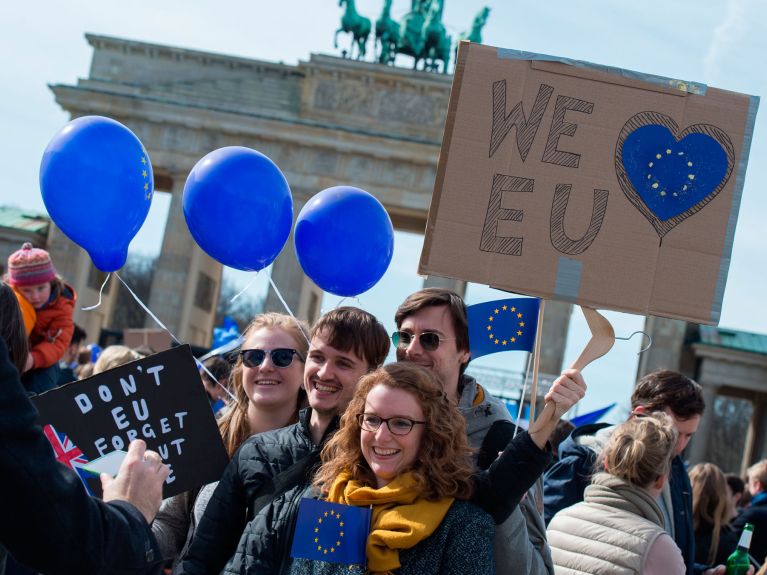“My hopes are pinned on the young”
Fighting for Europe: political scientist Gesine Schwan explains how to make the EU appeal to young people again.

Ms Schwan, you fight for Europe. Why do you keep seeking dialogue even when it is often difficult?
I was born in Berlin in 1943 with an awareness of just how much damage the war inflicted on Europe. From my earliest childhood, I therefore regarded Europe as a project concerned with peace and mutual understanding. I attended the French Lycée in Berlin, where bilateral understanding was a central focus. After leaving school I learnt Polish, and German-Polish relations became particularly important to me, also in my dissertation about the Polish philosopher Leszek Kolakowski. I see myself as a European and, in the current state of global upheaval in which we find ourselves, the European Union as the place in which social, cultural and political coexistence is most likely to be practised in the form that I believe is desirable.

What makes the project “European Union” so special?
The EU was and remains a wonderful opportunity to make the transition from wartime to peacetime. It has already served as a role model for many countries and continents such as the African Union. We have an obligation not to betray this role model.
Most people who engage with the EU on a professional level have no doubt about its value. Many ordinary citizens are sick of the EU, however. How does this discrepancy come about?
Radical market policy and the marketisation of all sectors of life have gained the upper hand over the past 30 years. This has given rise to dangerous inequalities. It is not the European Commission that is responsible for this, however, but the member states themselves. In my opinion, Germany has also seriously increased the rifts in the EU in favour of its own national interests. We must recognise that Europe will fail if we do not change our course.
Dieses YouTube-Video kann in einem neuen Tab abgespielt werden
YouTube öffnenThird party content
We use YouTube to embed content that may collect data about your activity. Please review the details and accept the service to see this content.
Open consent formHow can this be achieved?
Participation at the local, municipal level needs to be increased. If for example municipalities such as Gelsenkirchen, Nantes or Murcia were able to take charge of refugee integration themselves – with European support – the autonomy of citizens would be felt more strongly, as would the connection to Europe. It is not enough to put up a sign next to a motorway reading “built with EU grants” – that interests hardly anyone.
During the refugee crisis, you accused the EU and Germany of showing a “lack of solidarity”. What did you mean by that?
Since 2015, Germany has been complaining that the countries of Central and Eastern Europe have not shown solidarity with it when it comes to taking refugees. And yet for years the German government had previously shown no solidarity with the southern countries. Germany would always refer to the Dublin Regulation, which in terms of its structure is not based on the principle of solidarity, while Greece and Italy for the most part had to handle the influx of refugees. I propose setting up a European fund so as to Europeanise migration and refugee policy. The fund would reward municipalities for taking refugees – not only by reimbursing the costs, but also by providing an equivalent amount to finance their own development. This would make communities more willing to take refugees and would trigger a positive dynamism.
We are often unaware in our daily lives of the extent to which we in the EU depend on one another. We have long since become tied to one another in transnational terms.
Brexit, nationalism, inequality – the EU is battling with many challenges. What is at stake for its inhabitants if the union breaks apart?
The reason why Brexit appeared so threatening was that we feared a domino effect. Yet the opposite turned out to be the case: countries came closer together. We are often unaware in our daily lives of the extent to which we in the EU depend on one another. From production and trade to the organisation of education and medicine, we have long since become tied to one another in transnational terms.
We would have to waste such an inordinate amount of time splitting everything up again if we wanted to do away with the European Union. I think that the citizens of the EU are also well aware that that makes no sense. Nonetheless, our inner reliance on Europe is not sufficiently pronounced to ensure that we have a functional relationship – one based on trust – within the European Union. But would you want to live in a world in which everyone cheats one another? Surely that would be hell. My hopes are pinned on the young: it is young people who have the energy to change things.
Gesine Schwan comes from a socially-engaged family that belonged to resistance movements during the Nazi era. She ran for the office of Germany’s federal president in 2004 and 2009. For nearly ten years she was president of the European University Viadrina in Frankfurt an der Oder. In 2009 she teamed up with other academics to found the HUMBOLDT-VIADRINA School of Governance. Today she is the president and co-founder of the HUMBOLDT-VIADRINA Governance Platform – established in June 2014, it is committed to promoting democratic processes and governance strategies in Germany, Europe and the world.
Interview: Sarah Kanning

